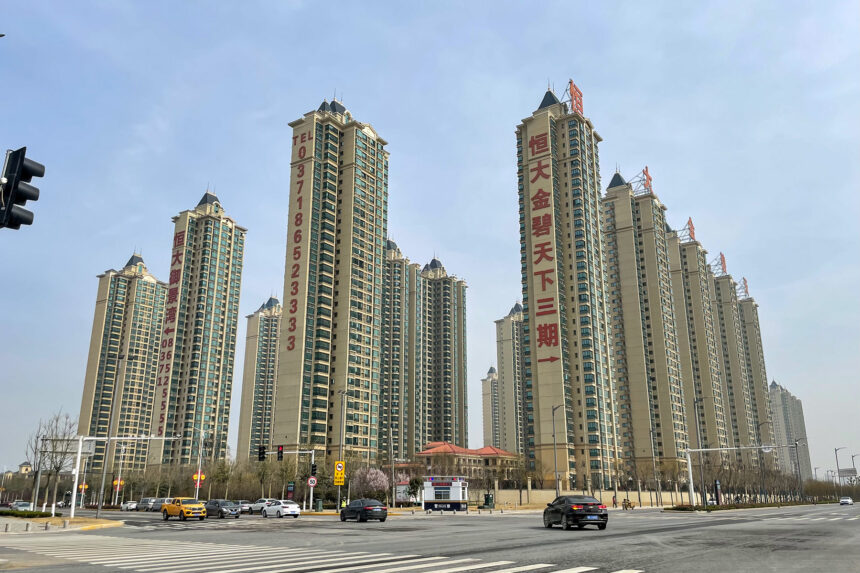Chinese property behemoth Evergrande has been officially removed from the Hong Kong stock exchange, ending more than 15 years of trading and cementing its status as one of the country’s most dramatic corporate collapses.
The delisting underscores the downfall of what was once China’s largest real estate developer, valued at over $50bn (£37.1bn) at its peak, before the mountain of debt that fueled its rapid rise dragged the company into a protracted crisis.
Analysts describe the move as both inevitable and final. “Once delisted, there is no coming back,” said Dan Wang, China director at the Eurasia Group.
From meteoric rise to downfall
Just a decade ago, Evergrande embodied China’s breakneck economic growth. Its founder, Hui Ka Yan, who rose from rural poverty, topped Forbes’ list of Asia’s richest people in 2017 with a fortune of $45bn. But Hui’s wealth has since collapsed to under $1bn, mirroring the decline of his company.
In March 2024, Hui was fined $6.5m and permanently banned from China’s capital markets after regulators found Evergrande had overstated revenues by $78bn. Liquidators are now investigating whether assets from his personal property holdings can be reclaimed for creditors.
At its height, Evergrande was managing 1,300 projects across 280 Chinese cities, and its empire stretched into electric vehicles and professional football. Guangzhou FC, once China’s most successful football club under Evergrande’s ownership, was expelled from the league this year after failing to clear debts.
The firm was built on an astonishing $300bn (£222bn) of borrowed money — making it the most indebted property developer in the world. Beijing’s 2020 reforms to rein in reckless borrowing crippled its cash flow, forcing Evergrande to offer properties at steep discounts and eventually default on overseas debts.
By January 2024, Hong Kong’s High Court ordered the company to be wound up, citing its failure to present a viable restructuring plan. Evergrande’s shares were already suspended and had lost more than 99% of their value by then.
Earlier this month, liquidators reported Evergrande still owed $45bn while having managed to sell only $255m in assets. They concluded that any comprehensive turnaround of the firm was “out of reach.”
“The delisting is largely symbolic now, but it represents a critical milestone,” Wang noted. Professor Shitong Qiao of Duke University added, “All that remains is the question of how much creditors will ultimately recover.” The next liquidation hearing is scheduled for September.
Wider impact on China’s economy
The collapse of Evergrande coincides with broader economic challenges for China — including President Donald Trump’s tariffs, mounting local government debt, subdued consumer spending, rising unemployment, and a rapidly ageing population.
Among these, the real estate slump has been the most damaging, experts say. “The property crisis is the biggest drag on China’s economy, and the main reason consumption has been suppressed,” Wang explained. The property sector once accounted for roughly a third of China’s GDP and was a vital revenue source for local authorities.
Professor Qiao observed that Beijing has yet to find a replacement driver of growth on the same scale. The industry’s collapse has caused mass layoffs, wage reductions, and eroded household wealth as property values have fallen by at least 30%.
With many Chinese families’ savings tied to real estate, the decline has discouraged spending and investment, said Alicia Garcia-Herrero, chief Asia-Pacific economist at Natixis.
Beijing’s response
China’s leadership has rolled out stimulus measures aimed at reviving housing demand, supporting the stock market, and spurring purchases of cars and household goods. Yet, despite injecting hundreds of billions of dollars, growth has slowed to around 5% — far below the double-digit rates that once characterized China’s expansion.
Experts doubt the property crisis is close to resolution. This month, China South City Holdings became the latest developer to receive a winding-up order in Hong Kong, the largest liquidation since Evergrande. Rival Country Garden is still struggling to restructure $14bn in foreign debt, with a key court hearing set for January 2026.
“The entire sector is under strain, and more developers will collapse,” Professor Qiao warned. While some market indicators suggest the downturn may have bottomed out, recovery is expected to be slow and uneven.
In June, Goldman Sachs forecast that housing prices would continue falling until at least 2027. Wang estimated the property market could stabilize in two years, though Garcia-Herrero struck a more pessimistic note: “There is no real light at the end of the tunnel.”
Beijing has avoided direct bailouts of developers, wary of encouraging further risky borrowing. Instead, President Xi Jinping has shifted the nation’s priorities toward advanced industries such as renewable energy, robotics, and electric vehicles.
“China is entering a new stage of development,” Wang concluded. “The era of property-led growth is over.”






